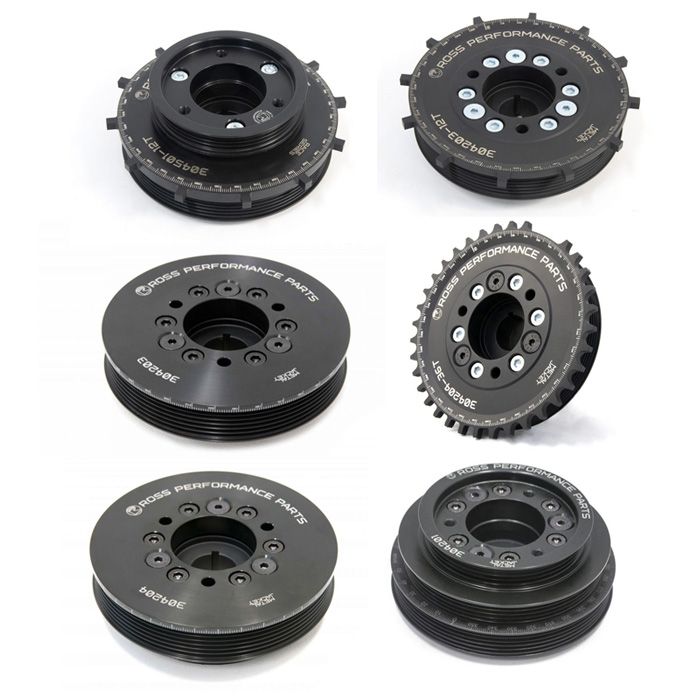Product added to cart
Ross Performance Nissan SR20 Harmonic Damper Front Crank Pulley
As low as
£411.53
£342.94
Lead Time: Make Selection For Availability
Only %1 left
SKU
ROSSPSR20FP
Fast Shipping
Hassle Free Returns
Nissan SR20 Harmonic Damper
Whether for a block stock OEM replacement or a dedicated high-performance engine, a Ross Performance Parts Harmonic Damper is the simple choice for harmonic and torsional vibration protection. We use the latest, state of the art technologies, and four decades of experience to design and manufacture a high-performance harmonic damper that is uncomplicated, bolt-on and perfectly suited to your Nissan SR20 engine.
Upgraded to the VE Oil Pump, no worries, our S13 and S14/S15 Harmonic Dampers are designed to run with the VE Oil Pump without any modification, just retain the S13 or S14/15 spacer.
Note: To retain Air Conditioning with a Triggered Harmonic Damper on the SR20 S14/S15 choose the SR20 S13 Metal Jacket Harmonic Damper from the options below.
Key Features:
Seamless integration with the Ross Performance Parts Dry Sump Drive Adaptor
Assembly mass optimised for high performance applications
Designed and manufactured in-house using CMM, 3D modeling and state of the art CNC technology
Bonded using our proprietary Ross Tuffbond process, incorporating anti-vibration, anti-tear natural rubber
Laser etched 360° timing marks
High-quality black finishes
Utilises grade 10.9 or better hardware
Complies with SFI 18.1
Note: Race Series does not have provision for crank driven air conditioning.
Please Note
*please check application before purchase, still unsure? email [email protected] or phone 01409231887
Need help choosing?
Damper Series – Choose which Tier of Ross Performance Parts Tuffbond Harmonic Damper suits your application.
Crank Trigger Profile – Choose the number of teeth for your crank trigger disc.
Sensors – Choose which style hall effect sensor you would like.
Still need more information? Email: [email protected]
Crank Pulley
Metal Jacket - Performance OEM Replacement
Designed for high performance street applications and occasional track use.
Retains all OEM accessories, belt locations and lengths.
power steering may be underdriven in some instances to improve performance at higher RPM's.
Race Series - High Performance Damping
Designed for high performance street applications and occasional track use.
For sustained Higher RPM with Underdriven alternator, water pump and power steering pulleys.
Typically air conditioner pulley is removed to allow increased damping mass.
Replaceable damper assembly for servicability.
Large diameter damping mass for increased inertia.
Gold Series - Top Tier Damping
Designed for a professional race application.
Identical pulley layout as race series.
Ultra high performance bronze alloy hub crank hub.


Crank Trigger Profile
Choosing your crank trigger profile
Firstly consult your engine tuner / builder for their preference to achieve an optimal tune.
Both 12T & 36T profiles are proven in high performance applications.
Both profiles exceed the minimum target dimensions reccomended by sensor manufacturers.
Both profiles are inegrally balanced.
All Ross Performance Parts triggers are mounted independant from the damping mass to provide clean, crisp timing data.






Hall Effect Sensors
Choosing Your Sensor
Firstly consult your engine tuner / builder for their preference to achieve an optimal tune.
Both the GT101 & Cherry sensors are the Hall Effect type.
Both sensors chare the same minimum target dimensions, reccomended target material and wiring requirements.
Typically Ross Performance Parts trigger kits are designed to suit either sensor option.


Further Help?
Why not check out Ross's technical aritcles, Installation guides & FAQ's located here
Crank Pulley (Harmonic Dampener)
Triggering
The instructions on this page are guidelines only.
It is recommended that the installation of any performance part be undertaken by a qualified automotive specialist.
Keeping our installation guides up to date is an ongoing process. If any information you require is not listed or if you have a specific question please contact our team directly.
High-quality components for automotive enthusiasts
In 1981, Ross Performance Parts started producing ultra-high-quality engine components for passionate automotive enthusiasts. Since then the modified car scene has changed a lot. Cars are now faster, engines more powerful, and the demands of modern racing are greater than ever. Ross Performance Parts engine protection solutions provide the assurance that your investment is secure, letting you #GoHarder for longer.
Now a global enterprise, Ross Performance Parts is a proud Australian company. Based in regional Victoria, Ross Performance Parts designs, develops and manufactures engine protection solutions for automotive fans around the world.
To maintain their position at the cutting edge of the performance automotive industry, they are continuously innovating and developing new ways to deliver more horsepower, more reliably. Ross's harmonic dampers, trigger kits, oiling systems and engine accessories have been proven by more than three decades of race and street use.
#RossPerformanceParts #SendItWithConfidence
| Lead Time | Make Selection For Availability |
|---|---|
| Part Type | Select Part Type |
| Engine | SR20DET Straight Cam, SR20DET Bent Cam, SR20DE Straight Cam, SR20DE Bent Cam, SR20DET, SR20DET GTiR, SR20VE |
| Product Brand | Please Select: |
| Manufacturer | Nissan |
| Model | Pulsar, Silvia |
| Variant | RNN14 GTIR, S13 180SX, S13 200SX, S14 200SX, S15 |


